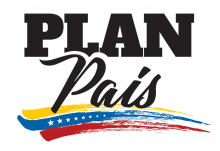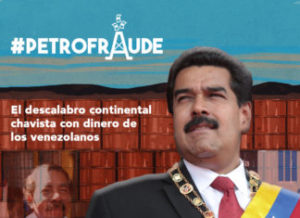 The United States is not seeking a military intervention as a solution to the economic and political crisis in Venezuela, the U.S. envoy to the troubled South American nation said in an interview published by a Venezuelan online news site, Reuters reports (HT:FDD)
The United States is not seeking a military intervention as a solution to the economic and political crisis in Venezuela, the U.S. envoy to the troubled South American nation said in an interview published by a Venezuelan online news site, Reuters reports (HT:FDD)
Norway-backed talks between Venezuela’s opposition and the government of President Nicolas Maduro must focus on elections, an opposition negotiator said on Monday, as the dialogue proceedings remain stalled after the government walked out, Reuters adds.
Policymakers must reckon candidly with the staying power of the Maduro regime, even while redoubling their best diplomatic efforts to dislodge it, argues Michael J. Camilleri, Director of the Peter D. Bell Rule of Law Program at the Inter-American Dialogue and a former Director for Andean Affairs at the National Security Council.

International Republican Institute
Given the dearth of other options, Washington should participate directly in the search for a negotiated solution, channeling its skepticism into shaping the conditions and agenda for talks rather than remaining on the sidelines, he writes for Foreign Affairs. While the Norwegian-sponsored negotiations have identified the outlines of a potential deal (early presidential elections with measures to ensure a free and fair vote), without U.S. engagement, the chances the talks will succeed are slim. RTWT
The United States would not prosecute or otherwise seek to punish Maduro if he voluntarily left power, despite bringing his country to the verge of economic collapse and humanitarian disaster, said Elliott Abrams, the State Department’s special envoy for Venezuela. He had seen no indication that Mr. Maduro was willing to step down, but his offer of amnesty was a message to Mr. Maduro, The New York Times reported.

Connectas
“This is not a persecution,” Mr. Abrams said of Mr. Maduro in an interview. “We’re not after him. We want him to have a dignified exit and go.”
Venezuelan oil production was steadily declining, estimating it at roughly 800,000 barrels a day, down from 1.1 million earlier this year, but Russia and China have been trying to prop up the regime.
“We believe Rosneft is buying that oil at a very significant discount from Venezuela and likely selling refined products at a very significant mark up,” said Abrams.

Connectas
It was too soon to say whether China’s National Petroleum Corp (CNPC), also a leading buyer of Venezuelan oil, had halted loadings in August amid U.S. threats of possible secondary sanctions, he told Reuters. “We will have to see what happens in August or September. We don’t have the data yet,” Abrams said. “It may be that CNPC no longer engages in it because it has global interests… but other Chinese companies pick up the slack,” he added.
Once the richest country in Latin America, #Venezuela is now in economic freefall, adds the International Republican Institute.* #GlobalPodcast‘s Travis Green chats with Venezuelan journalist, Carla Angola, discussing Maduro’s repressive regime, the media environment, and the international community’s response to the crisis.
*A core institute of the National Endowment for Democracy.







